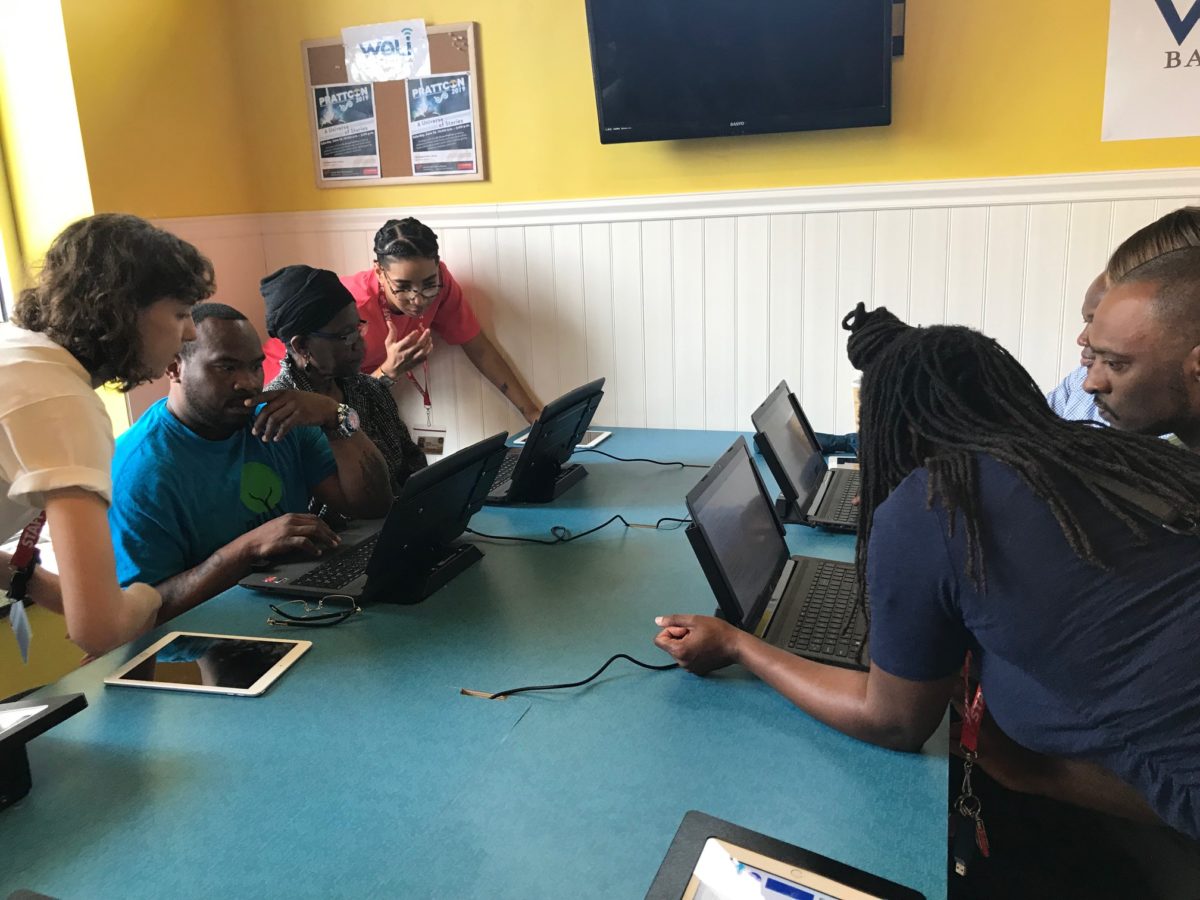Along Pulaski Highway in East Baltimore’s Ellwood Park neighborhood, the Hipp Laundromat gets crowded with nearby residents who head in for a regular spin cycle. But in between washing and folding, they’re often idle.
Alongside the washers and driers, a new station with laptops and tablets in the corner of the laundromat is providing a new connecting point for internet access.
It’s part of a newly launched program called the Wash and Learn Initiative (WALI). Enoch Pratt Free Library and Libraries Without Borders partnered on the effort, and are supported by the Robert W. Deutsch Foundation and the Media Democracy Fund. The Neighborhood Design Center, Open Works and the Coin Laundry Association were also involved.
With the technology stations at this and three other laundromats around the city, a new library initiative is looking to provide a place to connect with education and job resources. The devices are loaded with classes and other offerings from the library, as well as programs like Codeacademy and Scratch Jr. that are oriented toward using technology to build.
“It’s very important that our children, when they come with their parents washing clothes, can also have access to our computers as well,” Mayor Bernard C. “Jack” Young said at Hipp Laundromat on Monday.
A big focus is also on how to use the free programs offered. At two of the laundromats, librarians will also be on hand to provide programming centered around digital skills, and one-on-one guidance.
“They’re going to be in here working with customers at two of the locations at least 10 hours a week, and we’re going to bring in community partners for programs, as well,” said Heidi Daniel, CEO of the Enoch Pratt Free Library.
For libraries, digital access has brought a shift in how their programs can be delivered. We’ve seen tech become an increasing part of what’s offered inside local libraries. Along with running 22 locations and three mobile units, Daniel said the Pratt has also been working on efforts to expand outside of its walls to reach residents where they are.
“It’s about meeting people where they’re sitting and waiting,” said Lo Smith, a technology exchange fellow who is coordinating the WALI program for the Pratt; Smith is leading the project along with Azure Grimes and Carly Wais of Libraries Without Borders. “You’ve got 30 minutes where everything’s in the dryer and [there’s] nothing to do. That’s when you can sit down at a computer, and ask a librarian to help you reset your Gmail password and to do the stuff that maybe you are not comfortable doing on your own.”
WALI also aims to provide digital access in areas where residents can benefit from a neighborhood point for internet connectivity. A Deutsch Foundation report released in 2017 stated that more than 74,000 households in Baltimore City lack internet access. What was once a “nice to have” is now a “must have,” said Jane Brown, president of the Deutsch Foundation.
“Without a wired internet connection in the home, kids can’t do their homework, people can’t apply for jobs. It’s really that critical,” she said.
WALI is among the foundation’s work on digital equity initiatives to bring the internet closer to residents.
Libraries Without Borders works on tech access initiatives in laundromats in eight states and D.C. Executive Director Adam Echelman said the setting is ideal as a connecting point for a number of reasons: Along with being a place where people have to stick around for multiple hours, it’s also local to a specific community and draws repeat users, making it possible to build relationships over time.
“And even when the library closes, you still have access to technology, access to computers,” Echelman said.
For those who are new to technology, the librarians on hand can also help to break an emotional barrier that comes with learning something new, Smith said.
“It helps to have a smiling face,” they said. “It helps to have someone who understands where you are, to walk you though some of the harder parts and to coach, guide and support you along the way.”
In developing the program with specific cities, Libraries Without Borders puts a priority on what communities need. So in Baltimore, the resources also offer a tie-in not just to providing digital access, but also workforce development, children’s programming or civic engagement.
“There’s a range of things that fall under the umbrella of digital equity and we have to be flexible to that,” Echleman said.
For the Hipp Laundromat, the initiative helps expand on efforts to offer more programs for the community.
“One of the main reasons to partner with this program is because this area has limited resources,” said Manager Brendan McGoogan. “We’ve actually been providing incentives for residents of this area to come in, especially the kids. So for Wash and Learn to come in and say we’ll provide the laptops, we’ll provide the tablets, that takes a load off of what we’re already doing, and then it puts it on a broader scale. It’s taking what we’ve already been trying to incorporate here, and building on it.”
The technology stations are at the following locations below, with librarians at the first two sites:
- HIPP Laundromat, 3101 Pulaski Highway
- Laundry City, 3421 Frederick Ave.
- Sudsville Laundromat, 7001 Reisterstown Road
- Sudsville Laundromat, 3921 Erdman Ave.







